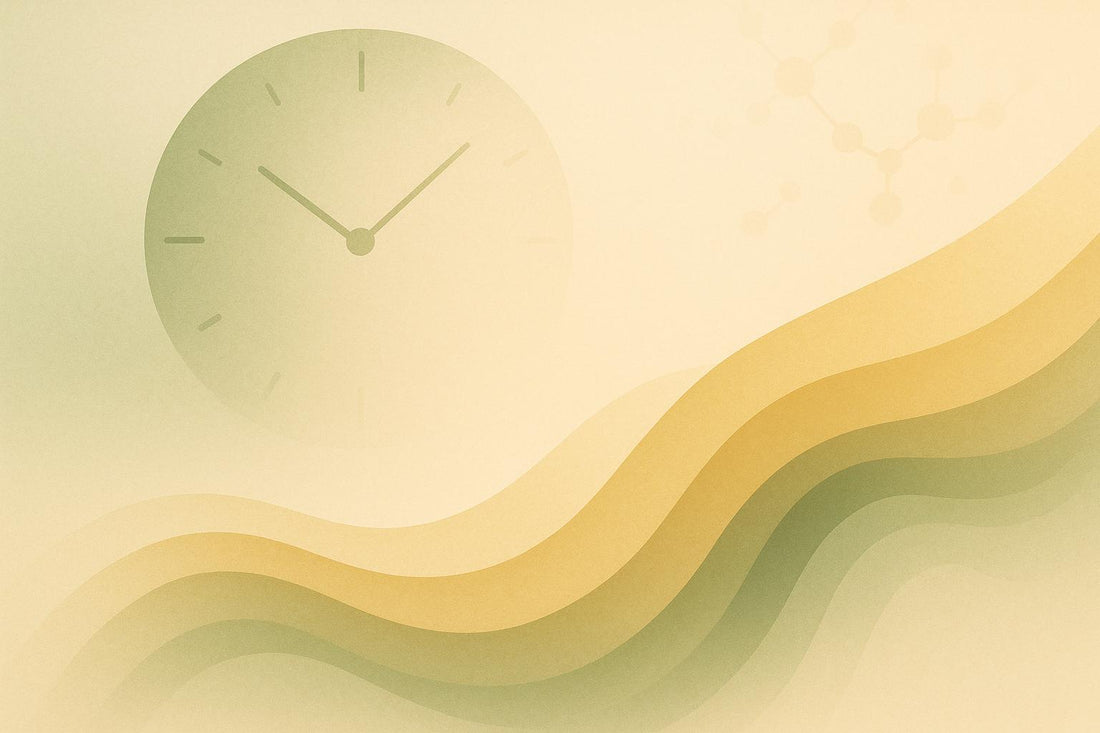Prolactin, a hormone linked to sleep and other functions, is deeply connected to your body's internal clock. Sleep disturbances can disrupt prolactin levels, leading to hormonal imbalances that affect fertility, immunity, and aging. Here's what you need to know:
- Prolactin peaks during deep sleep, helping regulate hormonal balance.
- Sleep loss disrupts prolactin, impacting other hormones like cortisol and melatonin.
- Shift work and aging weaken prolactin rhythms, making quality sleep even more critical.
- Long-term sleep deprivation can lead to broader health issues, including hormonal instability.
To maintain balance, prioritize consistent sleep and consider supplements like NMN, Resveratrol, Spermidine, and Fisetin, designed to support sleep cycles and hormonal health.
How High Prolactin Affects Your Health and Hormones
Daily Prolactin Patterns
Prolactin levels naturally fluctuate throughout the day, influenced by the body's internal clock. This rhythm determines when the hormone is released most actively.
Night-Time Prolactin Peaks
Prolactin levels are highest during sleep, particularly during deep sleep stages. This nighttime increase highlights the connection between quality sleep and hormonal balance. These peaks are carefully regulated by specific brain processes.
How the Brain Regulates Prolactin
The hypothalamus plays a central role in managing prolactin levels through a network of neurotransmitters and hormones. Here's how it works:
- Dopamine: Acts as a brake, suppressing prolactin release.
- Thyrotropin-releasing hormone (TRH): Promotes prolactin secretion when dopamine's effects decrease.
- Serotonin: Helps fine-tune the timing of prolactin release.
During sleep, dopamine activity decreases, allowing prolactin levels to naturally rise.
Prolactin Variations by Age and Gender
Prolactin patterns are also shaped by factors like age and gender. Women, particularly during their reproductive years, tend to experience more noticeable fluctuations than men. Life stages such as adolescence, the menstrual cycle, pregnancy, breastfeeding, and perimenopause can influence these changes. As people age, the daily prolactin rhythm can weaken, potentially affecting sleep quality and overall hormone regulation.
Sleep Loss Impact on Prolactin
Short vs. Long-Term Sleep Loss
Missing just one night of sleep can throw off the body's normal prolactin rhythm, disrupting its usual nighttime peak. When sleep deprivation becomes a long-term issue, the effects are more persistent, creating ongoing hormone imbalances. These changes don't just stop with prolactin - they can ripple out to affect other hormones as well.
Hormonal Shifts During Sleep Loss
When sleep is lacking, it's not just prolactin that gets affected. Hormones like cortisol, growth hormone, and melatonin are also thrown off balance. These changes are interconnected, making it harder for the body to reset without proper rest.
Night Shift Challenges
Working night shifts adds another layer of complexity to hormone regulation. Flipping the sleep-wake cycle disrupts prolactin’s natural timing, often delaying its peak or making it less noticeable. This misalignment doesn't just stop at prolactin - it’s part of a larger disruption to the body’s internal clock, which can lead to broader hormonal imbalances over time.
sbb-itb-4f17e23
Health Effects of Prolactin Changes
Impact on Fertility and Immune Function
Lack of sleep throws prolactin levels off balance, which can interfere with fertility and weaken the immune system. This disruption affects reproductive health in both men and women while also making it harder for the body to fend off infections. These changes point to a broader hormonal instability.
Hormonal Imbalance Across the Body
When prolactin levels are disrupted, it often signals a wider hormonal imbalance throughout the body. This highlights how deeply connected sleep is to the endocrine system, influencing far more than just reproductive and immune health.
Sleep's Role in Hormonal Health
Getting enough quality sleep plays a key role in keeping prolactin levels steady and maintaining overall hormonal balance. This helps protect reproductive and immune health, even when circadian rhythms are disrupted. It’s a clear reminder of how essential sleep is for overall well-being.
MASI Longevity Science and Hormone Health

MASI Longevity Science focuses on addressing how sleep loss impacts prolactin and other hormones, offering solutions to support healthy aging.
Sleep, Hormones, and Aging
Sleep, hormone levels, and aging are deeply interconnected. As we age, maintaining good sleep and balanced hormones becomes increasingly important. To tackle these challenges, MASI collaborates with experts from Mayo Clinic and Harvard Medical School. Together, they've created formulations designed to align with the body’s natural circadian rhythms and support hormone production.
MASI Sleep Support Supplements
MASI’s supplements are crafted to promote cellular health and regulate natural sleep cycles. By supporting the body’s sleep-wake patterns, these products help maintain the hormonal balance that plays a key role in aging well.
The supplement range includes:
- NMN – 1,000 mg to support cellular energy
- Resveratrol – 500 mg for cellular renewal
- Spermidine – 3 mg to promote cellular function
- Fisetin – 500 mg for cellular health
For the best results, MASI suggests dosing based on age:
| Age Group | Daily Dosage |
|---|---|
| 40-50 years | 1 capsule |
| 50+ years | 2 capsules |
Quality Standards
MASI ensures high-quality formulations to deliver reliable hormone and sleep support. Their manufacturing process adheres to strict standards, ensuring safety and effectiveness. Key highlights include:
- Produced in Germany using pharmaceutical-grade ingredients
- Independently tested in Switzerland for purity and safety
- Free from GMOs, soy, lactose, gluten, and common allergens
- Vegan-friendly and certified Halal and Kosher
MASI sources raw materials exclusively from certified suppliers in Germany, France, Italy, and the Netherlands [1]. Each batch undergoes rigorous testing for purity, microbiology, and heavy metals. Customers can access these test results for complete transparency.
Summary
Prolactin, circadian rhythms, and sleep work together to influence overall well-being. Studies indicate that losing sleep can interfere with prolactin secretion and disrupt hormonal balance, highlighting the importance of maintaining steady sleep patterns.
Stable sleep routines help regulate prolactin levels, while disruptions can cause imbalances, particularly as we age. Maintaining regular sleep-wake cycles and considering supplements tailored to your needs can help support hormonal balance.
MASI offers supplements designed to promote cellular health and support sleep regulation. Combining consistent sleep habits with age-appropriate supplementation can aid in healthy aging and balanced hormone levels.
FAQs
How does sleep deprivation impact prolactin levels and overall hormonal health?
Sleep deprivation can disrupt the natural circadian rhythm, which plays a crucial role in regulating prolactin secretion. Prolactin levels typically follow a daily cycle, peaking during sleep. When sleep is interrupted or insufficient, this cycle can be thrown off, leading to irregular prolactin levels.
Chronic sleep loss may contribute to hormonal imbalances that affect overall health, including reduced immune function, mood disturbances, and potential impacts on reproductive health. Prioritizing quality sleep is essential for maintaining healthy hormone regulation and overall well-being.
How do age and gender influence prolactin levels, and what steps can help maintain hormonal balance?
Prolactin levels naturally fluctuate based on factors like age, gender, and biological rhythms. For instance, women generally have higher prolactin levels than men, particularly during pregnancy and breastfeeding. Age-related changes can also impact prolactin secretion, with levels typically declining as individuals grow older.
To support hormonal balance, maintaining a healthy lifestyle is key. Prioritize consistent sleep patterns, manage stress effectively, and consider consulting a healthcare provider for personalized advice. Addressing sleep deprivation is especially important, as it can disrupt prolactin production and overall hormonal health. For those seeking additional support, MASI Longevity Science offers science-backed solutions to promote vitality and cellular renewal, contributing to overall well-being.
How can MASI supplements like NMN, Resveratrol, Spermidine, and Fisetin support hormonal health and regulate sleep cycles?
While the article focuses on the relationship between prolactin, circadian rhythms, and sleep deprivation, it does not explicitly discuss the role of MASI supplements in supporting hormonal health or sleep cycles. However, MASI Longevity Science offers a range of premium supplements designed to address key aspects of aging, including cellular renewal, vitality, and overall well-being. These factors may indirectly contribute to better hormonal balance and improved sleep quality. For specific guidance, consult a healthcare professional.




